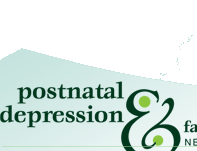 |

Postnatal Depression
Some important points for medical professionals to consider with both pregnant and postnatal mothers
Remember that making a diagnosis of PND has a huge impact on the wellbeing of the mother, baby and family.
In pregnancy
In the first year after giving birth
- Ask every postnatal woman how she is "really" and how she is coping.
- Be prepared to listen to her reply.
- Ask more than once, in different ways (take care not to seem patronising).
- Allow a new mother the time to talk about her experience of childbirth, her baby and her new role.
- When a mother complains of "tiredness", consider it to be PND until proven otherwise
- Consider routinely giving postnatal women the EPDS Questionaire to fill out (see Postnatal depression section which has a self scoring version of this)
- If you think someone is depressed but are not sure, get them to come back in a few days (as long as they are not a danger to themselves or the baby) to reassess. Ask them to bring their partner or other close friend/relative with them so that you can find out how they think she is.
Think about bipolar disorder and psychosis
- Do not assume they are not psychotic. You need to ask (see section on postpartum psychosis for suggestions about how to ask)
- Always screen for bipolar disorder, this means asking if they have ever had a time of increased energy (not necessarily elevated mood). For mixed episodes this might only be for a particular time of day, usually the evenings. To differentiate from a return to normal mood in the evening, ask does she feel revved up/unable to keep still and unable to get to sleep because racing thoughts and overactivity.
- Remember that mixed episodes of bipolar disorder can present as depression; it is the depressive symptoms that cause them to seek help. It can be very difficult elliciting the hypomanic or manic symptoms.
Involve her partner/family
- Speak with the womans partner or support person dont just ask the woman to tell you their partner's thoughts second hand. Ask permission to ring the partner (if permission is not forthcoming then it indicates a problem of some sort).
- Most women are very reluctant to try medication it may be best to say you think it is needed but offer some other strategies in the meantime. Give them information to read. See them in a few days/a week taking medication regularly requires commitment.
- Their partner needs to be committed as well, otherwise they can undermine your efforts.
- What antidepressant to use? See CAQ or section on Medications.
- Encourage women to use a simple diary to record symptoms, like the one in our fact sheets section.
Ask also about
- Alcohol and drugs.
- Suicidal ideas or thoughts of harming the baby. This would point to a more serious illness with the need for urgent psychiatric help.
- Abuse both physical and verbal agression in their relationship. If the partner is always present, try to find a way to get the woman alone so that you have an opportunity to ask her. Also ask if she has she ever hit her partner.
- Remember that community service card holders may be able to utilise a disability allowance or counselling allowance.
Follow-up
- One of the most important aspects of treatment is "being there". This means offering regular contact and support.
- Regular contact with a mother after an intial diagnosis of PND is important. A practice nurse phone call every week or regular scheduled appointments help.
- Some form of regular follow-up greatly improves the outcome.
- For health professionals it is often better to arrange regular follow-up appointments rather than saying "ring me if there are problems" or "ring me if things don't improve".
- It is very difficult for people in need to make further contact and if you make a follow-up arrangement, it gives the message that you care whether they are better or not.
- As a person improves space these appointment apart. Even when they have recovered appointments every few months are worthwhile - mood disorders are often recurrent and should be regularly reassessed.
Consider
- Giving all mothers the EDPS to fill in at the 6 week, 3 month and 5 month vaccination checks.
- If you have to choose only one of these times, choose 3 months.
- Mothers have to wait 20 mins after the vaccination and this can be a good time to fill this out.
Reference: Dr William Fergusion, How to Treat Postnatal Depression, New Zealand Doctor, 26 Sept 2007, 23-27
See information for women on postnatal depression and depression in pregnancy.
Core Features of a Major Depressive Episode (In adults)
Core Symptoms
Depressed mood or loss of interest/pleasure: Either a persistent feeling of low mood or an absence of any pleasure. This may include a lack of positive feelings towards the baby or alternatively the baby may be the only source of pleasure or interest.
Low Energy: Marked tiredness, lethargy, lack of feeling refreshed in the mornings or poor motivation. If observed for significant periods of time by others they would notice a slowness or loss of vitality.
Other Symptoms
Sleep disturbance: This can be insomnia or hypersomnia (excessive sleeping). It may be attributed to the baby waking. To differentiate between waking due to the baby vs sleep disturbance due to depression, ask if they wake before or after the baby wakes (before suggests depression) and how long it takes them to get back to sleep after they have fed their baby (most non-depressed mothers fall back to sleep readily)
Appetite changes: Depression is often associated with a decrease in appetite resulting in weight loss however in postpartum women there is frequently an increase in appetite.
Negative thoughts: Thoughts of inadequacy, especially as a mother, worthlessness or excessive guilt. Exaggerated negative thoughts towards others, especially those closest are also common.
Cognitive Difficulties: Deceased ability to think clearly. This may include difficulty concentrating, or indecisiveness, or memory difficulties. This makes it difficult to multitask and to think ahead which, in turn makes looking after other children a major challenge.
Morbid Thoughts: Recurrent thoughts of death, particularly fears that the baby will come to harm or that she, or her partner will die and therefore leave the baby uncared for. Alternatively she may be preoccupied with suicidal thoughts and feel the baby would be better off without her.
Other features
- Symptoms are present and persistent throughout at least a two week period.
- Significant distress or impairment in day to day functioning results. This can be easily missed by others as many mothers spend a considerable period of the day 'alone' with their baby.
- Symptoms are not better explained by the direct physiological effects of another illness or substance/medication
|
Bereavement
|
It can be difficult to differentiate between depression and bereavement and often depression complicates bereavement. Bereavement means not only loss by death but can involve adjusting to a baby born with major developmental abnormalities or major illness, such as those babies born with serious cardiac abnormalities requiring surgery. If babies require extended periods in Neonatal Intensive Care this is particularly stressful and can cause bereavement in some mothers.
Depression should be considered more likely in these mothers if there is a strong past history of depression or if:
- the symptoms persist for longer than 2 months
- there is marked functional impairment
- there is morbid preoccupation with worthlessness or guilt
- suicidal ideation is present
- psychotic symptoms are present
- psychomotor retardation or marked agitation is present
|
Recurrent Major Depressive Disorder
|
Depressive disorder is said to be recurrent if someone has suffered from two or more Major Depressive Episodes in their lifetime.
For the episodes to be considered 'separate' a interval of at least 2 months of minimal or absent symptoms separates the two episodes.
A history of a Manic Episode, a Mixed Episode, or a Hypomanic Episode should be actively enquired about as the presence of any of these indicates a bipolar, rather than unipolar, mood disorder.
Depressive disorder tends to be a recurrent disorder with risk of relapse particularly high in the first year (hence the recommendation to stay on antidepressant medication for this time). Many psychiatrists would recommend lifelong treatment for those who have suffered from three or more serious episodes.
Prophylactic antidepressant medication in the postpartum should be considered for women with previous episodes of postnatal depression or frequent previous episodes of non-postnatal depression. |
|
 |





